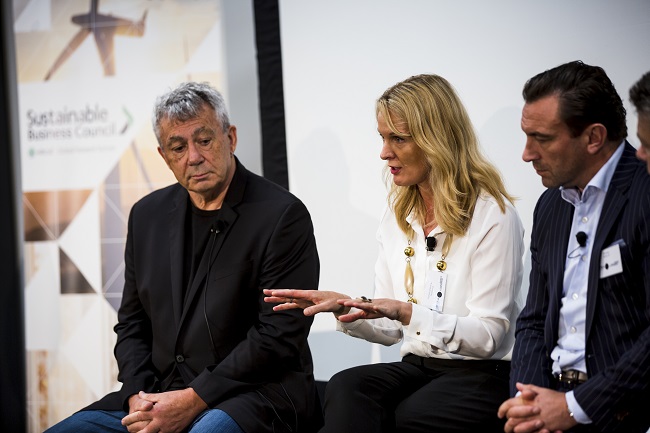(Un)learning our way to the future of work together
A fundamental transformation of work is underway. From changes in workplace structures to automation; business processes to future skills, and the need to build capability for a lifetime of (un)learning – the nature of work is evolving quickly and on a large scale. The social aspects of sustainability come to the fore here, as our members turn their thoughts to how best to look after their people and their communities.
A fundamental transformation of work is underway. From changes in workplace structures to automation; business processes to future skills, and the need to build capability for a lifetime of (un)learning – the nature of work is evolving quickly and on a large scale. The social aspects of sustainability come to the fore here, as our members turn their thoughts to how best to look after their people and their communities.
Opportunities abound – from new and improved products and services, to reconsidering the roles of individuals, organisations and societies at work, in ways that not only create value and boost productivity, but also enable people to thrive. But there are risks if preparations are poorly managed, including skills mismatches, increased inequality, job displacement and a casualisation of work. This calls for urgent, decisive action – both individually and collaboratively – to seize these opportunities and to mitigate potential risks.
Our initial focus has been to build understanding of the challenges and opportunities facing business and the need to prepare for these. We held a briefing on the issues and launched a background paper for an audience of more than 60 executives, people leaders and directors in April. View the event highlights.

Panel discussion in April: Frances Valintine, MindLab speaking. Alos on the panel: Rob Campbell, SKYCITY, Summerset and thl, and Kirk Hope, CEO, BusinessNZ. Not pictured: Diane Edwards, GM People, Systems and Technology and Tony Gibson, CEO, Ports of Auckland, and Andrew Grant, McKinsey.
Member Insights
In exploring the potential role SBC could play, members have told us:
- The Future of Work is a ‘buzz word’ which means all things to all people and is often misunderstood.
- It is complex, and involves many stakeholders and lots of action (and even more talk) which can be overwhelming.
- Leadership and good practice is fast emerging, but initial action is frequently risk-based and resource constrained, without a clear understanding of the opportunity.
- Collaborations are relatively small scale, fragmented or slowed by political process.
- Without coordination, duplication of effort is a real risk, and opportunities will be lost.
- There is an appetite among members to collaborate on shared issues to drive meaningful action and systems change.
Codesign through an Innovation Sprint
A group of SBC members and thought leaders met in July to collaborate on critical issues facing business to shape and drive the Future of Work and adopt new ways of working.
The group agreed on five areas of focus:
1. Purpose & Identity – Building purpose-driven organisations and workplace cultures that foster belonging and authentic human connection.
2. Learning – The need for more sophisticated workforce development planning, given the impacts of technology on skills, roles and tasks, and for lifelong learning that inspires, empowers and motivates beyond the workplace.
3. Diversity, Inclusion & Belonging – how do we open up more human-centric workplaces, that embrace diversity, inclusivity and equality, and align businesses to the Wellbeing Budget 2019?
4. No one left behind – Tackling growing inequalities, marginalisation and exclusion. How do we develop cultural competencies, capabilities to bring diversity into workplace models, practices and thinking?
5. New economic models – Ensuring systemic conditions support human and environmental wellbeing at an enterprise level, and remuneration systems at a societal level reflect broader wellbeing value as well as economic value creating more equality and equity.
What is next?
We will be holding a second SBC collaboration: a co-design innovation sprint in Auckland on 3 September to collectively determine the specific problems (or opportunities) for which a series of ‘experiments’ will be prototyped as scalable solutions to these issues and to drive systems change.
We will also be exploring a suitable e-platform to collate, share and promote good practice, resources and learnings, to improve our understanding, improve coordination of effort, and facilitate collaborative problem solving.
How you can help?
- Connect us with your Chief People Officer, HR, Culture and People Leaders who might like to be involved in this programme. They will be welcome to join us at the next innovation sprint.
- Invite your Chief People Officer, HR, Culture and People Leaders to provide feedback via this survey on the critical issues facing your business and NZ Inc. that could benefit from collaboration.
Places on the sprint are limited – but please connect us with your Chief People Officer, HR, Culture and People Leaders who might be interested in participating. We also want to ensure a diversity of participants including age (young and mature employees), gender identity and ethnicity.
For more information, please contact Rob Perry, Sustainable Leadership Manager for SBC.
Contact: Robert Perry, Sustainable Leadership Manager
Phone:
Email:
